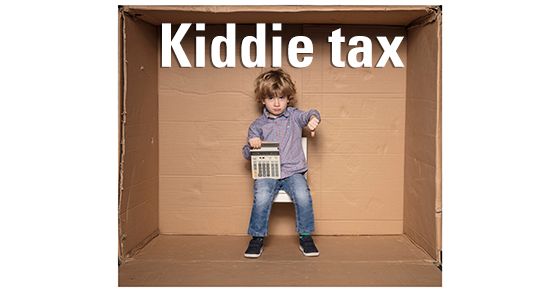Years ago, wealthy parents would shift investments to their children because children had lower tax rates, which meant less tax on investment income. Shifting income to children was a very successful tax strategy until Congress got involved and closed the loophole. Congress decided that the investment income of children should be taxed at the highest marginal income tax rate of their parents. They called it the Kiddie tax.
Of course, not every child gets taxed at their parents' rates, as certain requirements need to be met. Your child will be subject to the Kiddie tax if ALL the following requirements are met:
- In 2023, the child's investment income exceeds $2,500.
- At least one of the child's parents is alive at the end of the tax year.
- The child must not have filed a joint return for the year.
- The child must meet ONE OF THE following age conditions:
-
- Be under 18 years old.
- Be 18 years old and his/her earnings from employment do not exceed half of the support provided by the parents.
- Be a full-time student aged 19 to 24, and his/her earnings from employment do not exceed half of the support provided by the parents.
If your child met all these requirements, congratulations! He or she will be taxed at your highest marginal rate, and you will probably be the one to pick up that tax bill. However, if one of the requirements is not met, (for example, in 2023 the child's investment income was less than $2,500), then you can simply ignore the Kiddie tax requirement and move on with your life.
How does one account for the Kiddie tax? The default option is to attach Form 8615 to the children’s tax return. However, parents can also utilize Form 8814, known as "Parents' Election to Report Child's Interest and Dividends," which they will include to their own tax return. Filing form 8814 with parents’ returns can help parents avoid the hassle of dealing with their child's separate tax return and the associated tax preparation expenses. Parents can choose Form 8814 if their child meet ALL the following criteria:
- Be under age 19 (or under age 24 if a full-time student).
- In 2023, have a gross income of less than $11,500.
- Possess income solely from interest and dividends (no capital gain on disposition of property or stocks. Capital gains are reported on the child's own tax return using Form 8615).
- Have made no estimated tax payments or applied over payments from the previous tax year (or any amended return) to the current tax year under the child’s name and Social Security number.
- Not have federal income withheld from their income under the backup withholding rules.
- Be required to file a federal return unless this election is made.
- Not file a joint return for the tax year and
- The parent must be qualified to make the election, either as the custodial parent, the parent with higher taxable income when the parents’ filing status is married filing separately, or if both the child’s parents file a joint return.
Please note, when parents are unmarried, the kiddie tax is based on the tax rate of the custodial parent. For married individuals who file separately (MFS status), the parent with the higher taxable income dictates the applicable tax rate for calculating the kiddie tax.
Now that we've discussed the requirements, let's talk about options to mitigate this unpleasant tax. Parents have several strategies to reduce the impact of the kiddie tax, including:
- Consider holding onto appreciated stocks of your child until he or she is old enough that the kiddie tax rules no longer apply.
- Refrain from gifting dividend-producing stocks to your children until they have surpassed the “danger” age.
- Instead of gifting, opt out for investment in a §529 college savings account. The earnings within a §529 account grow tax-deferred and remain untaxed when used for qualifying educational expenses.
- For children who work, consider establishing a Roth IRA for them and contribute funds to this plan. Earnings within a Roth IRA generally do not get taxed.
- Lastly, leverage tax-deferred investments such as U.S. savings bonds, certificates of deposit, or treasury bonds that won't mature in the current year.
In summary, the Kiddie tax rules play a vital role in ensuring fair taxation and preventing misuse of lower tax rates. Parents can check the criteria to see if the rules apply to them and if they are liable for the Kiddie tax. When confused about forms or requirements, it is always a good idea to consult a tax CPA who will do tax filing for you and will also suggest tax saving strategies. Kiddie tax is expensive, but it can be avoided or at least reduced.

